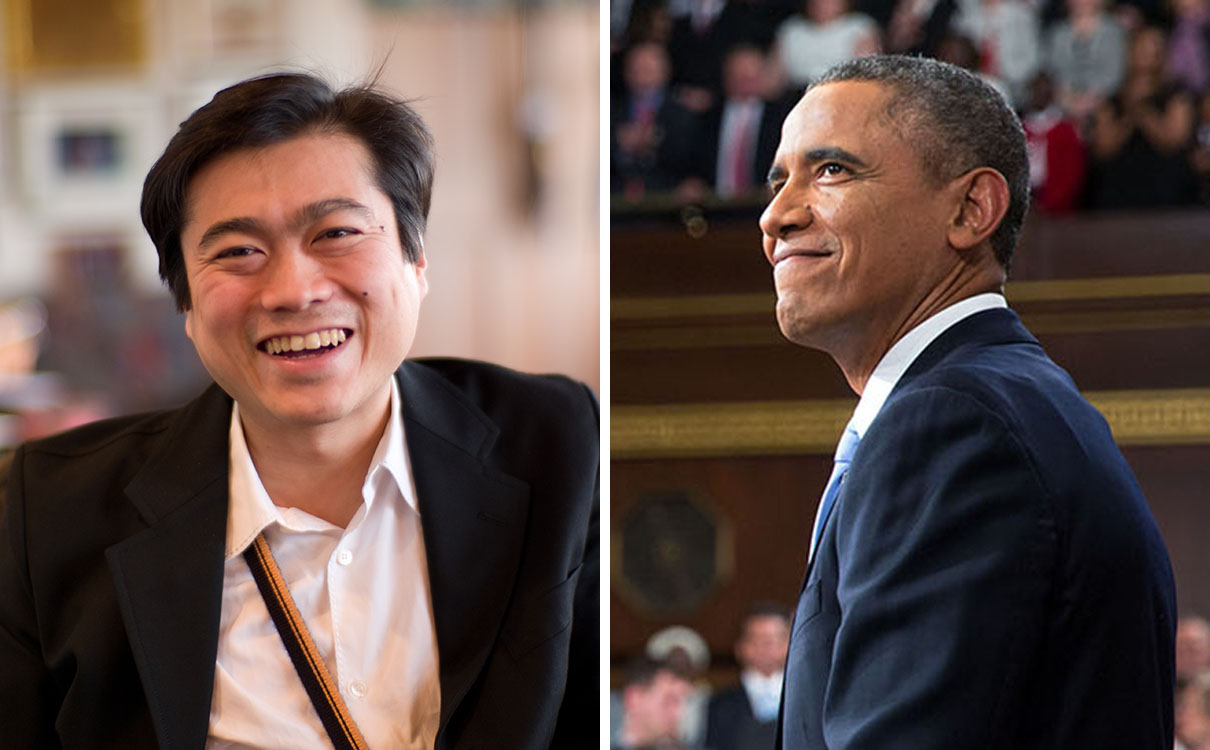President Obama Sat Down with MIT’s Joi Ito for Wired

Photos via Joi Ito on Flickr/Creative Commons, by Pete Souza/The White House on Flickr/U.S. Government Work
Feel free to disagree with Barack Obama on policy. But there should be no question, except to the deeply cynical, that he makes for a damn good interview. Here is a man who can spout off sports stats with the best of them, probe racial animus with Marc Maron, kill at the White House Correspondents’ Dinner, deadpan with Zach Galafianakis, and hold his own with an MIT luminary about artificial intelligence.
That last one was his latest sit-down on his lame-duck press tour, a Q&A in the November issue of Wired magazine, for which the president is guest editor.
With a month left of this X-rated sideshow of an election we’re having, take a moment to reflect on how, for the past eight years, we had someone in the most powerful seat in the country who can toss up a decent jump shot, geek out about Star Trek, and discuss the nuances of generalized and specialized AI with one of Cambridge’s brainiest, MIT Media Lab director Joi Ito (who shares some pretty candid thoughts on the personality types at MIT and in Silicon Valley).
The two engaged in a wide-ranging discussion with Wired editor in chief Scott Dadich for the frontiers-themed issue, with topics ranging from AI and self-driving cars to autism and The Martian. Go ahead, bask in the brilliance:
Here are a few things we learned:
1. Ito says many of the thinkers at MIT may be on the autism spectrum, and argues that neurological variables like that are needed for science to advance. Obama agrees:
Part of what makes us human are the kinks. They’re the mutations, the outliers, the flaws that create art or the new invention, right? We have to assume that if a system is perfect, then it’s static. And part of what makes us who we are, and part of what makes us alive, is that we’re dynamic and we’re surprised.
2. However, Ito also points out that in areas such as artificial intelligence, a lack of diversity and experience could be a problem:
This may upset some of my students at MIT, but one of my concerns is that it’s been a predominately male gang of kids, mostly white, who are building the core computer science around AI, and they’re more comfortable talking to computers than to human beings. A lot of them feel that if they could just make that science-fiction, generalized AI, we wouldn’t have to worry about all the messy stuff like politics and society. They think machines will just figure it all out for us.
3. Speaking of new technology, Obama is quite attuned to the conversation happening at MIT and elsewhere about the moral problems inherent in programming self-driving cars (which, by the way, are headed to Boston soon).
There are gonna be a bunch of choices that you have to make, the classic problem being: If the car is driving, you can swerve to avoid hitting a pedestrian, but then you might hit a wall and kill yourself. It’s a moral decision, and who’s setting up those rules?
4. An apparent sharing problem at Harvard may be the wrong way to do science, Obama says:
Part of our project in precision medicine is to gather a big enough database of human genomes from a diverse enough set of Americans. But instead of giving money to Stanford or Harvard, where they’re hoarding their samples, we now have this entire genetic database that everybody has access to.
5. It wouldn’t be election season if Obama didn’t slip in a jab about Donald Trump.
What I spend a lot of time worrying about are things like pandemics. You can’t build walls in order to prevent the next airborne lethal flu from landing on our shores. Instead, what we need to be able to do is set up systems to create public health systems in all parts of the world, click triggers that tell us when we see something emerging, and make sure we’ve got quick protocols and systems that allow us to make vaccines a lot smarter.
(Sidebar: How do you think Trump would hold up in a conversation with Ito?)
6. Ask any grownup geek in Kendall Square, and they’ll tell you Star Trek has a lot to do with the way they think about technology and the future (Ito calls the Federation “amazingly diverse”). Obama, too, apparently has the USS Enterprise on the brain even when it comes to legislative dealmaking:
When we think about spaceflight, we’re still thinking about basically the same chemical reactions we were using back in the Apollo flights. Fifty years later and it seems like we should—I don’t know if dilithium crystals are out there—but, you know, we should be getting some breakthroughs.
..
Star Trek, like any good story, says that we’re all complicated, and we’ve all got a little bit of Spock and a little bit of Kirk [laughs] and a little bit of Scotty, maybe some Klingon in us, right? But that is what I mean about figuring it out. Part of figuring it out is being able to work across barriers and differences.
7. Ditto for The Martian, the Matt Damon space movie:
[I]t showed a bunch of different people trying to solve a problem. And employing creativity and grit and hard work, and having confidence that if it’s out there, we can figure it out. That is what I love most about America.
Read the full conversation on Wired.com.

